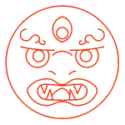<Theosophical Conference 2017, Osaka>
第3セッション 政治と秘教思想
3rd session POLITICS AND ESOTERICISM
日時:2017年3月8日10時〜12時45分
Date and time: March 8, 2017, 10:00 am – 12:45 pm
場所:国立民族学博物館第4セミナー室
Venue: Seminar Room 4, National Museum of Ethnology, Osaka
発表者:杉本良男
Presenter: Yoshio SUGIMOTO
題目:マハートマ・ガンディーと秘教(日本語、通訳つき)
Title: Mahatma Gandhi and Esotericism (in Japanese, with an interpreter)
概要:
モーハンダース・「マハートマ」・ガンディー(1869-1948)は、没後70年近くなってもさまざまな謎が浮上し、はげしい論争の的になっている。ガンディーはサティヤーグラハあるいは非暴力運動の指導者として、またインド独立をもたらした政治的指導者として評価されているが、一方で、偉大な精神的指導者、社会改革者、近代社会、産業文明への批判者、インド文明の伝道者などの面をもち、さらに近年の社会・環境問題への先駆的批判者ともなっている。
本報告では、ガンディーにおける秘教、とりわけ神智学協会とキリスト教秘教ユニオンの影響について検討し、その現代的意義について述べる。ガンディーは、ロンドン留学の初期にマダム・ブラヴァツキーとアニー・ベサントに会い、また1890年代半ばまでメイトランドとも知的交流があり、一時ユニオンの南アフリカでの代理人も名乗っていた。ガンディー自身、教会とユニオンはほとんど違いはない、と後年述べているが、秘書であったピャレーラールの言によれば、その影響は生涯にわたって続いたという。
Abstract:
Mohandas ‘Mahatma’ Gandhi (1869-1948) remains an enigma, and has remained an ever-beckoning and an ever-elusive subject of study. He is widely known as the ‘great prophet of satyagraha and non-violence,’ and the architect of the Indian independence movement. Gandhi, however, was a great deal more than a non-violent activist and political leader. He was a great spiritual leader, social reformer, critic of modernity and industrial civilization, interpreter of Indian civilization, and before all things a forerunner of the many of the great social and ecological movements of our times.
In this paper, I examine the influence of Esotericism on Gandhi’s thought, particularly, of the Theosophical movement and Esoteric Christianity, during late 1880s to 1890s in his London and early South Africa periods. Gandhi met Madame Blavatsky and Annie Besant in November 1889 in London Lodge. He read The Key to Theosophy (1889), became an associate member of the Society. He later mentioned: “Theosophy is the teaching of Madame Blavatsky. It is Hinduism at its best. Theosophy is the Brotherhood of Man.”
He has also deeply influenced by The Perfect Way, or The Finding of Christ (1882). of Anna Kingsford and Edward Maitland. The authors joined the Theosophical Society, and Kingsford became the president of London Lodge, for a short period from 1883 to 1884. Interestingly, Gandhi told that “to me there is little difference between Theosophy and Esoteric Christianity.” He was launching himself as an agent of the Esoteric Christian Union, organized by Maitland, in South Africa in 1894. Pyarelal Nayar, Gandhi’s secretary, mentioned that Esoteric Christianity had a “specific and lasting influence” on Gandhi’s thought.
J.T.F. Jordens, in the title of book on Gandhi’s religion, compared the idea of Gandhi as “bulky homespun shawl.” This paper is an attempt to examine the “warmth” of Gandhi’s thought.
発表者プロフィール Profile
所属:国立民族学博物館名誉教授
Academic affiliation: Professor Emeritus at the National Museum of Ethnology
研究分野:社会人類学、南アジア研究
Research field: Social anthropology of South Asia
主要業績 Major publications ( in Japanese):
『インド映画への招待状』(2002)
『現代インド6環流する文化と宗教』(共編、2015)
『スリランカで運命論者になる』(2015)
「比較による真理の追求 : マックス・ミュラーとマダム・ブラヴァツキー」Searching for Truth through comparison : Max Müller and Madame Blavatsky、『国立民族学博物館調査報告』90, 173-226, 2010-03-31
「四海同胞から民族主義へ : アナガーリカ・ダルマパーラの流転の生涯」From Universal Brotherhood to Buddhist Nationalism : The Vicissitudes of the Ideology of Anagarika Dharmapala、『国立民族学博物館研究報告』36(3), 285-351, 2012
「闇戦争と隠秘主義 : マダム・ブラヴァツキーと不可視の聖地チベット」The Great Game and Occultism : A Genealogical Anthropological Study、(特集 マダム・ブラヴァツキーのチベット) 『国立民族学博物館研究報告』40(2), 267-309, 2015
現在の研究:
現在は、南インド社会の構造変動、キリスト教とナショナリズム、ポピュラー・カルチャーとナショナリズム、などについて調査研究を行っている。
Work in progress:
Christianity and popular cultures in the context of nationalism in India
